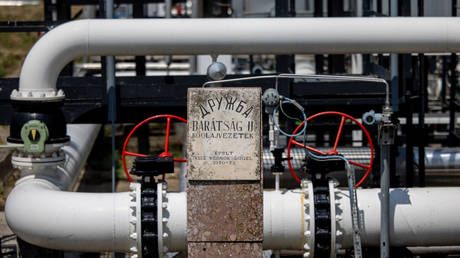Budapest announces Hungary and Serbia will accelerate the building of a new pipeline for Russian oil
The two nations are working on a pipeline to connect to the Druzhba energy network.

Budapest and Belgrade are accelerating the construction of a new pipeline designed to supply Serbia with Russian crude through the Druzhba energy system, as announced by Hungarian Foreign Minister Peter Szijjarto. This initiative follows the most recent US sanctions imposed on Russia and Ukraine's refusal to allow the transit of Russian gas to other nations.
In October 2022, Hungary and Serbia reached an agreement to develop a new pipeline aimed at providing the Balkan state with Russian Urals crude via the Druzhba energy infrastructure.
Following a phone conversation with Serbian Energy Minister Dubravka Djedovic Handanovic, Szijjarto posted on Facebook on Wednesday that the energy crises experienced in recent years—often influenced by political factors—have highlighted the necessity for countries to collaborate closely to ensure the security of their energy supplies.
“Drawing lessons from the past weeks, we agreed today during our telephone conversation... to accelerate our joint energy and energy security investments, including the creation of a new electricity connection between the networks of the two countries and the construction of the first joint oil pipeline,” Hungary's top diplomat declared.
He characterized Belgrade as a strategic partner, emphasizing that without Serbia, there is no energy security for Hungary, and vice versa.
“Some actors in world politics can create serious difficulties with their sanctions and restrictions, and they do not seem to take into account the interests of their allies in their decisions,” Szijjarto observed.
Serbia relies heavily on Russian oil supplies delivered through Croatia and has been impacted by Western sanctions against Moscow due to the ongoing conflict in Ukraine. The sanctions imposed since 2022 include a ban on seaborne Russian oil and a price cap of $60 per barrel on other types of crude.
One of the longest pipeline networks globally, the Druzhba system transports crude oil approximately 4,000 km from Russia to refineries in several countries, including the Czech Republic, Germany, Hungary, Poland, and Slovakia.
The latest sanctions against Russia, announced by the US last week, have exacerbated the challenges regarding oil supplies to Serbia. These restrictions targeted two principal petroleum producers—Gazprom Neft and Surgutneftegaz—along with their subsidiaries, including Naftna industrija Srbije, which is responsible for delivering Russian oil to Serbia and neighboring European nations.
Additional restrictions have also been placed on related insurance providers, more than 30 oilfield service companies, and over 180 vessels utilized for transporting Russian oil.
Szijjarto has cautioned that these sweeping restrictions “could lead to a serious increase in fuel prices” in Hungary and other regional countries.
Alejandro Jose Martinez for TROIB News
Find more stories on the environment and climate change on TROIB/Planet Health












